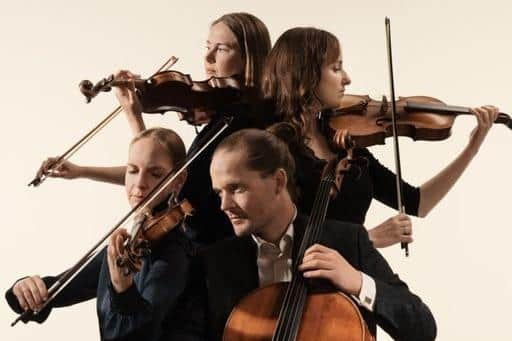Music review: The Dudok Quartet Amsterdam, Paxton House
Music at Paxton: The Dudok Quartet Amsterdam, Paxton House, Berwickshire ***
If it appeared ironic for the British-based Piatti Quartet to call off Friday’s programme due to the train strikes and be replaced by the Netherlands-based Dudok Quartet Amsterdam, but the latter nonetheless provided their own brand of refreshing opener to this year’s ten-day Music at Paxton festival.
Advertisement
Hide AdAdvertisement
Hide AdTheir aim is not, they declared in a series of chatty interjections, to limit repertoire to the bespoke string quartet canon – anything from 18th century father-of-the-genre Haydn to the present day – but to explore much earlier music through their own transcriptions and adaptable playing style. Thus this unorthodox programme began with a brief set of Medieval/Renaissance arrangements before resorting to clean classical Mozart and richly romantic Tchaikovsky.


Their opening gambit was quirky, from a raw realisation of Viderunt Omnes by the pioneering 12th-century polyphonist Pérotin, so feisty and rustic it sounded like prototype Bartok, to the anachronistic chromatic contortions of Gesualdo’s madrigal Deh come invan sospiro, a tad bland perhaps in this wordless context. Separating these was a weirdly out-of-tune (the deliberate use of so-called “just intonation”) Kyrie by Machaut, its impact more grating than enlightening.
Few problems in that area – merely minor technical glitches – when it came to Mozart’s K590, the last of his three Prussian Quartets. Here, the Dudok presented their most convincing interpretation: crisp, invigorating, mesmerisingly interactive and instinctively sensitive to the synergetic complexity of the scoring.
Another transcription – Lensky’s Aria from Tchaikovsky’s Eugene Onegon – proved charming, if inconsequential, as a preface to the same composer’s String Quartet No3, but that latter work – his final quartet – boasted characterful insight, mostly in the cascading theatrics and muted angst of the contrasting inner movements. From a detailed perspective, synchronising issues occasionally rocked the boat. From a musical one, there were numerous delights to savour.